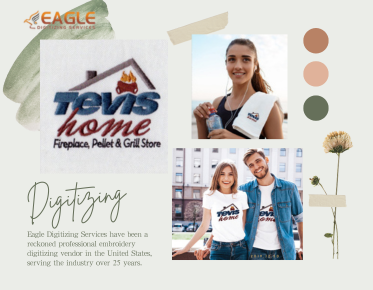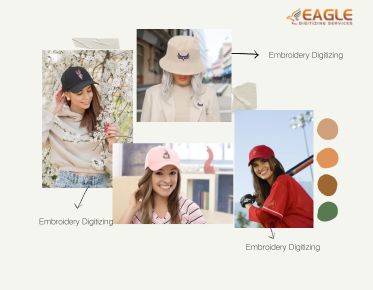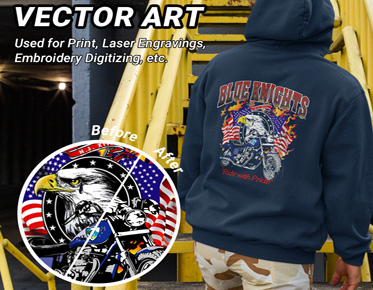Unlock Your Creativity with Vector Art and Customizing Stickers
Stickers have
become one of the most versatile forms of self-expression and branding in the
modern world. Whether you're promoting your business, celebrating an event, or
just adding a personal touch to your belongings, stickers are an affordable,
effective way to get your message across. But what makes a sticker stand out in
a sea of designs? The answer lies in vector art.
With its ability to create sharp, scalable, and highly customizable designs,
vector art is the secret ingredient to making stickers that not only catch the
eye but also endure the test of time.
What Makes Vector Art Perfect for Custom Stickers?
At the core of
every high-quality custom sticker is a powerful tool: vector art. Unlike raster
images, which are made of pixels, vector graphics are built using mathematical
equations to create shapes and lines. This results in designs that are
infinitely scalable without losing resolution. Whether you're printing a tiny
sticker for a laptop or a massive one for a car window, vector art ensures that
your design maintains its crispness and clarity.
Step-by-Step Guide to Creating Custom Stickers with Vector Art
Choosing
the Right Software for Your Sticker Design
To get started
with creating custom stickers using vector art,
you'll need the right software. Adobe Illustrator is the industry standard,
offering powerful tools for creating and editing vector graphics. However, free
programs like Inkscape also offer robust features for designing vector-based
stickers. Choose the software that works best for you, keeping in mind that
you’ll need a platform capable of creating clean, scalable designs.
Creating
a Unique Design: Tips for Getting Started with Vector Art
When it comes to
designing custom stickers, creativity is key. Start by brainstorming your
design concepts, considering what will resonate with your audience. Focus on
simple shapes, bold colors, and clean lines—vector art is great for
minimalistic designs, but it also allows for intricate, detailed illustrations.
Begin by drawing basic shapes, then build on them using the software's pen
tool, paths, and curves to create your ideal design.
How
to Use Layers and Paths to Build Your Sticker Art
Layering is one
of the most effective techniques when designing with vector art. Use different
layers to separate elements of your design, such as background colors, text,
and graphics. This makes it easier to adjust or modify specific parts of your
sticker without affecting other elements. Mastering paths and anchor points in
vector software will allow you to create smooth, precise lines that define your
design.
Exploring Different Sticker Shapes with Vector Art
How
to Create Perfect Circles, Squares, and Custom Shapes for Stickers
Vector
art
makes it easy to create any shape, from simple circles and squares to more
complex, custom forms. These shapes can be resized without distortion, ensuring
that they fit perfectly on the material of your choice. Use the shape tools in
your vector software to create geometric designs, and then fine-tune the shapes
using curves and paths for a more unique look.
Designing
Irregular and Die-Cut Stickers with Precision
Custom die-cut
stickers—those with irregular shapes—are a great way to make your designs stand
out. With vector art, you can design intricate shapes with razor-sharp
precision. Whether it’s a logo, a character, or an abstract shape, vector
graphics allow you to create unique, eye-catching designs that flow with the
contours of your chosen material.
Why
Custom Shapes Help Your Stickers Stand Out
Custom shapes can
elevate your sticker designs, giving them a unique edge that grabs attention.
Instead of using standard square or circular stickers, create dynamic shapes
that fit the message or aesthetic of your brand. Whether it’s a logo designed
to follow a specific contour or a whimsical shape that adds personality to your
design, custom shapes help your stickers stand out from the crowd.
Adding Color and Texture to Your Sticker Designs
How
to Choose the Right Color Palette for Your Stickers
Color plays an
essential role in sticker design, as it can impact everything from brand
recognition to emotional appeal. When selecting your color palette, choose hues
that align with your brand or the purpose of your stickers. Vibrant, bold
colors can make your stickers pop, while more muted tones can lend
sophistication and style. Ensure that your color choices have enough contrast
to make your design legible, especially if the sticker will be used in a variety
of settings.
Using
Gradients and Patterns to Add Depth and Interest
Vector art also
allows for the use of gradients and patterns, which can add depth and dimension
to your designs. Gradients give a smooth transition between colors, making your
stickers more dynamic. Patterns, whether simple or complex, can add texture and
visual interest, making your stickers more captivating.
Ensuring
Your Sticker Colors Pop with Proper Contrast
Contrast is key
when designing stickers that need to grab attention. Ensure that your design’s
text, graphics, and colors stand out against the background by adjusting
contrast levels. The clearer your message, the more effective your sticker will
be. Use high contrast between colors to ensure readability, especially if your
stickers will be displayed at a distance.
Using Typography in Sticker Design: Tips and Tricks
How
to Incorporate Text Into Your Sticker Designs
Text is an
essential component of many sticker designs, but it needs to be incorporated
thoughtfully. Choose fonts that are legible, especially if your design features
a message or tagline. Whether you use simple, bold fonts or intricate, custom
lettering, ensure that the text complements your vector art, not overpowers it.
Choosing
Fonts That Complement Your Vector Art
Typography should
always complement the visual style of your design. Pair clean, modern fonts
with sleek, minimalistic art, or opt for playful, handwritten fonts with fun,
expressive designs. The key is to ensure the font doesn’t clash with the
overall aesthetic but enhances it.
Making
Your Message Stand Out with Custom Lettering
If you’re after
something truly unique, consider creating custom lettering. Vector art gives
you the ability to design personalized fonts or letterforms that are perfect
for your brand’s personality. Custom typography allows you to create an
unmistakable style that’s entirely your own.
Understanding Sticker Materials and How Vector Art Fits In
What
Are the Best Materials for Stickers?
The material you
choose for your stickers can influence their durability, look, and feel.
Popular choices include vinyl, paper, and polyester. Vinyl is known for its
weather-resistant properties, making it ideal for outdoor use. Paper is more
affordable and great for indoor applications, while polyester is durable and
often used for specialty stickers.
How
Vector Art Works on Vinyl, Paper, and Other Materials
Vector artworks
seamlessly across a variety of materials, ensuring your design maintains its
integrity. When printed on vinyl, the precision of vector lines makes your
sticker stand out with vivid color and sharp edges. On paper, the crispness of
the design still ensures the sticker’s appeal, and on specialty materials, the
flexibility of vector graphics ensures
compatibility across different substrates.
Choosing
the Right Finish: Matte, Glossy, or Transparent Stickers?
The finish of
your stickers can affect both their appearance and functionality. Matte
finishes provide a smooth, non-reflective surface, while glossy finishes offer
a vibrant, shiny look. Transparent stickers are perfect for applications where
the background should show through, like on windows. Choose the finish that
complements your design and intended use.
The Importance of Quality Resolution in Sticker Printing
Why
Vector Art Ensures Your Stickers Look Professional
The resolution of
your design is key to ensuring high-quality sticker printing. Vector art
guarantees that your designs are always printed at the highest resolution
possible, with no risk of pixelation or blurriness. This makes your stickers
look crisp, professional, and well-crafted every time.
How
to Export Your Vector Designs for the Best Print Quality
When exporting
your vector designs, ensure that you're saving the files in the correct format
(typically EPS, SVG, or AI) and with the appropriate color settings for print
(usually CMYK). This will ensure that the printed version matches the vibrant,
clean design you created digitally.
Avoiding
Pixelation and Resolution Issues in Sticker Printing
One of the main
benefits of vector art is that it completely eliminates the risk of pixelation
in printing. Since vector designs are based on mathematical formulas rather
than pixels, they remain sharp and crisp no matter how large or small they are
printed.
How to Customize Stickers for Different Purposes
Creating
Business Stickers That Reflect Your Brand’s Identity
Custom stickers
are an excellent way to promote your business and build brand recognition.
Vector art allows you to design stickers that reflect your brand’s identity,
from logos to promotional messages. These stickers can be used for packaging,
giveaways, or as part of your marketing materials.
Fun
and Creative Sticker Ideas for Personal Use
Stickers aren’t
just for businesses—they’re also great for personal use. Customize stickers to
decorate your laptop, water bottles, or phone cases. Whether you're designing a
fun slogan, a favorite quote, or a custom illustration, vector art gives you the
tools to create unique designs that express your personality.
Customizing
Stickers for Events, Promotions, and Giveaways
Vector art also
plays a key role in designing stickers for special events and promotions. From
weddings to product launches, stickers are a memorable way to celebrate and
promote. Whether you’re designing commemorative stickers or giveaways for a new
campaign, vector art ensures your stickers remain eye-catching and effective.
In the world of custom stickers, vector art is the key to creatingdesigns that are sharp, scalable, and impactful. With its precision, durability, and versatility, vector art allows you to craft stickers that stand the test of time, no matter where they’re placed. Whether you're designing for business, personal use, or special events, vector art ensures your stickers will impress every time. With its ability to deliver high-quality designs that can be printed on a variety of materials, vector art truly is the perfect choice for any custom sticker project.



